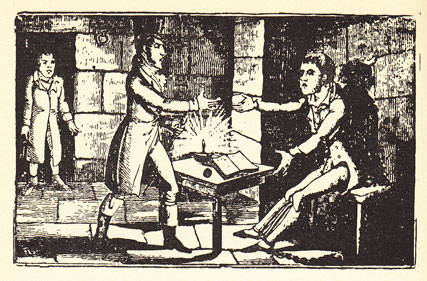
Poison Panic is the product of a huge amount of research. An enormous amount of research. Writing the book meant the synthesis of all that information. It is inevitable that even with the greatest care, a couple of errors might slip in.
I went over and over the book, many, many times, before I submitted it to my editor, then I checked the proofs three times, and I combed through it another three times when indexing it. Even so, a handful of errors slipped past me!
So here and now, let me confess what they are.
Page xix. Caption to the image of Alfred Swaine Taylor in the laboratory with George Owen Rees, ‘performs the Reinsch test.’ It’s more likely to be the Marsh test, which involves burning gas and collecting the residue to test for arsenic. Or a number of other tests. As the illustration comes from a newspaper report at the time of William Palmer trial, it’s possible that it’s a test for strychnine. That all said, when I was writing Taylor’s biography, Fatal Evidence, I found out that he denied ever posing for the drawing. On investigation it appears that an artist working for the Illustrated Times, who published a “Rugeley special” in the lead up to the William Palmer trial, had cobbled the image together from an illustration in the same issue of the inquest into the death of Palmer’s brother. Taylor and Rees both appear in that image in identical poses as they do in the laboratory image, and on the same page in the Illustrated Times, other individual “portraits” of people in the main inquest illustration appear, similarly repurposed. Therefore, who knows what this test is meant to be as it appears to have leapt forth from the imagination of the artist.
Page 50. ‘So Wilkins married them without fees, on 5 November 1841.’ This should read 1842 – you can see the correct date in the marriage certificate at the foot of the page.
Page 96. ‘At the time of the inquest, the landlord was Joseph Newcomb.’ Erm… no. Until April 1848, the landlord of the Crown Inn was Thomas Newcomb, not Joseph Newcomb. And at the time of the inquest in August 1848, it was a landlady running the pub – one Sarah Newcomb, Thomas’s widow. Thomas died in the April. Presumably there was nothing suspicious about Thomas Newcomb’s demise, otherwise Sarah would’ve been rather unnerved by the inquest into Thomas Ham’s death being conducted in her pub.
Page 136. ‘Four years later, Professor Taylor was called on as the scientific witness when Dr Smethurst was accused of murdering his wealthy wife.’ This should read ‘Three years later.’ The trial of William Palmer took place in 1856, and the trial of Thomas Smethurst in 1859. Palmer was on trial accused of a death which happened in 1855, which was probably what my mind was calculating.
If I have the opportunity, these errors will – of course – be rectified in future editions.